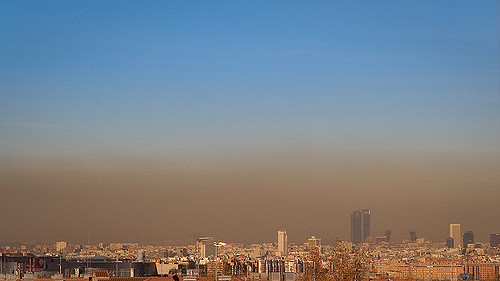Pollution in Madrid has been front page news for several days now. In addition to the already alarming levels of pollution over recent months, we are having a particularly warm autumn, making the cloud of smog hanging over the city even thicker. Limiting speeds in certain areas and prohibiting parking in the city centre are some of the measures that have been taken by the local authorities over the past few days, but is there anything else that can be done?
Over 70% of the cars in Spain currently run on diesel, and some 20% on petrol. This means that around 90% of the vehicles on the road right now are highly polluting.
In the midst of these figures, there is a very recent and encouraging number: 4% of the vehicles purchased by Spaniards to August run on “alternative fuel”. This group includes hybrid and electric vehicles, and those running on compressed natural gas (CNG). Why are these vehicles exempt from the restrictions recently imposed by the City of Madrid? Because, as the local authorities have explained, “The use of CNG in vehicles significantly reduces their environmental impact as it produces practically no sulphur oxide (SOx) emissions, reduces nitrogen oxide (NOx) emissions by 75%, and produces 25% less carbon dioxide.” In this context, the Ministry for Industry, Energy and Tourism has put in place a Strategy for the Promotion of Alternative Fuel Vehicles (AFV) in Spain for 2014-2020.
The issue in Madrid is the closest to us, but by no means an isolated case. Most of the actions applied to urban areas with over 200,000 inhabitants are now assessed by experts to help decide and implement impact measures. These include the vehicle bans already in force in cities such as Stockholm, Vienna, Oslo and Helsinki, which are several years ahead of us in this area.
London opted years ago for imposing a weekly charge or toll for those wishing to drive into the city centre. Although this measure has discouraged traffic in the centre, it is nevertheless a controversial issue.
In Paris, the mayor Anne Hidalgo has made her “Anti-Pollution Plan” one of the main pillars of her political programme. This summer, in the light of pollution rates that caused serious alarm – in France alone 48,000 people die prematurely each year due to pollution – a bill came into force regulating traffic in the city centre. In addition, there are the measures the French Government is approving for the purchase of environmentally friendly vehicles, such as natural gas-powered vehicles (NGVs).
Environmental advantages are often synonymous with financial savings. In the case of NGVs, there is a 30% saving per kilometre compared to diesel engines, and 50% in the case of petrol. The short term investment is more than worthwhile, but I have to admit that in many cases, the cost of adapting from a traditional engine to a gas-powered one, and that the direct purchase of an NGV requires considerable initial outlay.
For this reason, Enagás have decided to promote the use of gas-powered vehicles among our employees, so that they can benefit from a subsidy scheme at the time of purchase and further assistance for refuelling costs.
The great problem of urban pollution is not easy to solve and, as I see it, it is important to take stronger measures than occasional traffic restrictions or imposing charges, which is always controversial. On one hand, it is essential to have active policies for the promotion and improvement of public transport, while on the other, general policies and agreements must be developed to promote less polluting vehicles, including those powered by natural gas. At Enagás we are working in this direction, and we are willing to cooperate on initiatives intended to reduce urban pollution.
